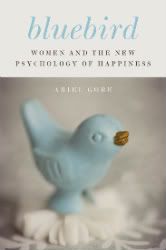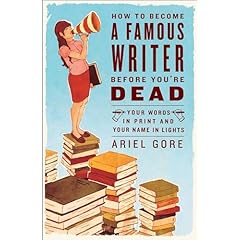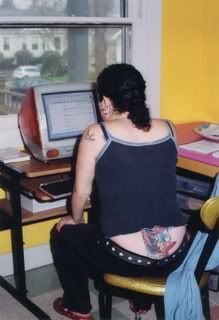We need a new genre...
Poor James Frey, busted for exaggerating parts of his memoir, A Million Little Pieces. Well, not so poor. The book, already an Oprah multi-million-copy bestseller, has gotten all kinds of new press since The Smoking Gun published an expose claiming that James fabricated or embellished details of his law-breaking days.
Did James get drunk back in '92, hit a cop with his car, and then get in a fight with said cop? Or did James get drunk back in '92, hit a cop with his car, and then behave politely and cooperatively? Or did he, in fact, get drunk back in '92, hit the curb, and then get arrested without incident? Maybe he gt drunk and imagined the whole thing. Seeing as drunks aren't famous for their memory and cops aren't famous for writing accurate police reports, it's pretty hard saying. More importantly, who cares?
And so we come back to the question someone will inevitably ask me next week when I start a new session of The Memoir Workshop I teach in Portland. What's a memoir, anyway?
I tell my students that a memoir isn't an autobiography. It isn't journalism. It isn't your testimony. It's your story. If you're making stuff up to con people or make yourself more tragic or brilliant than you are, then you're full of it. I'm not interested. But if you feel that your story is true--if it's your truth--then we shall call it memoir. A memoir is to a journalistic autobiography as a movie "based on real life events" is to a documentary. As James mentioned on Larry King last night, it's standard practice to recreate remembered conversations in a memoir. Future memoirists don't usually carry tape recorders, so unless we want to keep writing things like "my mother said something about how I'd never make anything of myself," we've got to give her a specific line: "You'll never make anything of yourself!"
When we go to write our stories, sometimes we try our best to show things exactly as they happened. And sometimes we knowingly ignore the facts to tell the truth. Memoirs are supposed to read like novels--that's why folks like them. But real lives don't unfold like fiction. What to do? Change things for the geometry of the story. Don't change the bones of the story, but by all means--change the details.
I published Atlas of the Human Heart--teenage vagabond tale--as a memoir. If I'd never been to China or Kathmandu or Europe--well, that would have been . But what if I'd been there and I tailored the story to fit artistically within a 256-page novel-like book? What if I changed the race of a rapist? What if I traveled back and forth from Beijing to Hong Kong six times and, for simplicity's sake, collapsed all those journeys into a single action-packed trip? What if, as a Californian, 50 degrees felt like freezing. Could I say it was freezing? I mean, I'm not going to say it was two degrees out when it was 50, but I was cold, all right? What if I changed the names of my characters? What if I changed their hair-dos to protect them or make them sexier? What if I gave the villain a blue beard because, to me, he was bluebeard from the old fairy tale?
So what if James Frey wasn't such a bad boy after all? He isn't messing with anybody's reputation but his own. He isn't running for president. It hurts us not at all whether James socked the cop or wimped out entirely.
Ah, but then why not publish the thing as a novel? Good question. But it's essentially a publishing and marketing decision. Here now in the American publishing industry, things have got to be classified: Memoir, novel, how-to, history, autobiography, short stories, journalism . . . whatever. In the Barnes and Noble warehouse, they've got to know which aisle to put you in.
Before I published Atlas of the Human Heart, I went over my own remembering and writing process with my editor. I didn't really care if the publisher wanted to classify the book as a memoir or a novel--the distinction is cosmetic--but I wanted to be clear that we had the same basic definition of the classifications.
I'm a journalist by training, so, yes, if I'm writing something for a newspaper, I make damn sure that anything inside a pair of quotes actually got said. I can't embellish. But a literary writer can't win. If he puts out a "novel" that's essentially a story from his life, folks will pan it as "thinly veiled autobiography." If he puts out a "memoir" and makes himself sound uglier or dumber or drunker than he actually was--and if he sells too many copies of that memoir--folks start calling him a liar.
I tried to deal with the problem in Atlas by bringing it up right at the start. "This one's a work of fiction, meaning it's about 76 percent true. Or it's a memoir, meaning it's about 76 percent false." But the first question at virtually every reading I did was, "So, what part's true?" Hell if I know. A funny thing happens when you tell a story--the story you tell actually begins to replace the memory. This can be a problem in a court of law. We shouldn't have to worry about it in a work of art. I should be able to show you a toaster with a cowboy hat on and call it "Portrait of My Mother." And I should be able to assume that you'll understand I don't literally think I'm the offspring of an appliance.
So, maybe what we need in literature isn't more truth or more fiction--it's a new genre all together. If publishers and booksellers insist on classification, we need a choice "C." We need... The I-novel. My story, not my testimony. The way I remember things--punched up for your edu-tainment.
"Good book," folks will be able to say. And then maybe they'll leave us alone.
As far as I'm concerned, James pummeled that cop.
And I'm just really happy that my next book is a novel. Made up. No, I don't have the stigmata. Pure fiction.
Did James get drunk back in '92, hit a cop with his car, and then get in a fight with said cop? Or did James get drunk back in '92, hit a cop with his car, and then behave politely and cooperatively? Or did he, in fact, get drunk back in '92, hit the curb, and then get arrested without incident? Maybe he gt drunk and imagined the whole thing. Seeing as drunks aren't famous for their memory and cops aren't famous for writing accurate police reports, it's pretty hard saying. More importantly, who cares?
And so we come back to the question someone will inevitably ask me next week when I start a new session of The Memoir Workshop I teach in Portland. What's a memoir, anyway?
I tell my students that a memoir isn't an autobiography. It isn't journalism. It isn't your testimony. It's your story. If you're making stuff up to con people or make yourself more tragic or brilliant than you are, then you're full of it. I'm not interested. But if you feel that your story is true--if it's your truth--then we shall call it memoir. A memoir is to a journalistic autobiography as a movie "based on real life events" is to a documentary. As James mentioned on Larry King last night, it's standard practice to recreate remembered conversations in a memoir. Future memoirists don't usually carry tape recorders, so unless we want to keep writing things like "my mother said something about how I'd never make anything of myself," we've got to give her a specific line: "You'll never make anything of yourself!"
When we go to write our stories, sometimes we try our best to show things exactly as they happened. And sometimes we knowingly ignore the facts to tell the truth. Memoirs are supposed to read like novels--that's why folks like them. But real lives don't unfold like fiction. What to do? Change things for the geometry of the story. Don't change the bones of the story, but by all means--change the details.
I published Atlas of the Human Heart--teenage vagabond tale--as a memoir. If I'd never been to China or Kathmandu or Europe--well, that would have been . But what if I'd been there and I tailored the story to fit artistically within a 256-page novel-like book? What if I changed the race of a rapist? What if I traveled back and forth from Beijing to Hong Kong six times and, for simplicity's sake, collapsed all those journeys into a single action-packed trip? What if, as a Californian, 50 degrees felt like freezing. Could I say it was freezing? I mean, I'm not going to say it was two degrees out when it was 50, but I was cold, all right? What if I changed the names of my characters? What if I changed their hair-dos to protect them or make them sexier? What if I gave the villain a blue beard because, to me, he was bluebeard from the old fairy tale?
So what if James Frey wasn't such a bad boy after all? He isn't messing with anybody's reputation but his own. He isn't running for president. It hurts us not at all whether James socked the cop or wimped out entirely.
Ah, but then why not publish the thing as a novel? Good question. But it's essentially a publishing and marketing decision. Here now in the American publishing industry, things have got to be classified: Memoir, novel, how-to, history, autobiography, short stories, journalism . . . whatever. In the Barnes and Noble warehouse, they've got to know which aisle to put you in.
Before I published Atlas of the Human Heart, I went over my own remembering and writing process with my editor. I didn't really care if the publisher wanted to classify the book as a memoir or a novel--the distinction is cosmetic--but I wanted to be clear that we had the same basic definition of the classifications.
I'm a journalist by training, so, yes, if I'm writing something for a newspaper, I make damn sure that anything inside a pair of quotes actually got said. I can't embellish. But a literary writer can't win. If he puts out a "novel" that's essentially a story from his life, folks will pan it as "thinly veiled autobiography." If he puts out a "memoir" and makes himself sound uglier or dumber or drunker than he actually was--and if he sells too many copies of that memoir--folks start calling him a liar.
I tried to deal with the problem in Atlas by bringing it up right at the start. "This one's a work of fiction, meaning it's about 76 percent true. Or it's a memoir, meaning it's about 76 percent false." But the first question at virtually every reading I did was, "So, what part's true?" Hell if I know. A funny thing happens when you tell a story--the story you tell actually begins to replace the memory. This can be a problem in a court of law. We shouldn't have to worry about it in a work of art. I should be able to show you a toaster with a cowboy hat on and call it "Portrait of My Mother." And I should be able to assume that you'll understand I don't literally think I'm the offspring of an appliance.
So, maybe what we need in literature isn't more truth or more fiction--it's a new genre all together. If publishers and booksellers insist on classification, we need a choice "C." We need... The I-novel. My story, not my testimony. The way I remember things--punched up for your edu-tainment.
"Good book," folks will be able to say. And then maybe they'll leave us alone.
As far as I'm concerned, James pummeled that cop.
And I'm just really happy that my next book is a novel. Made up. No, I don't have the stigmata. Pure fiction.




